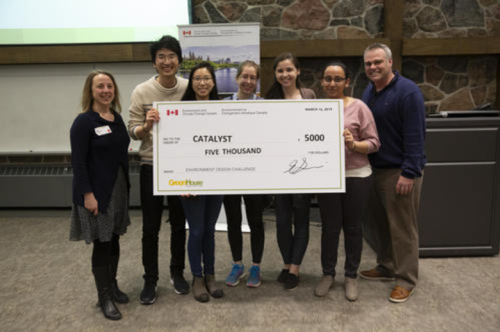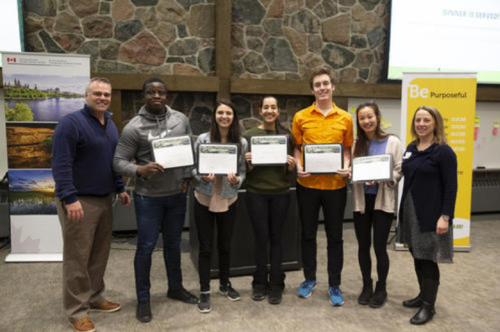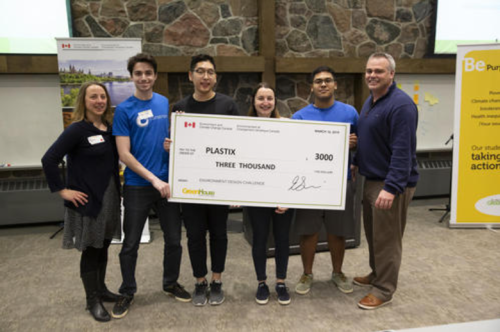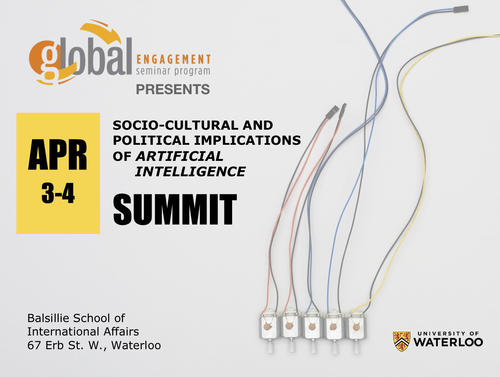The Daily Bulletin is published by Internal and Leadership Communications, part of University Communications
Contact us at bulletin@uwaterloo.ca
Submission guidelines
Editor:
Brandon Sweet
University Communications
bulletin@uwaterloo.ca

Design challenge $5,000 grand prize winners The Catalyst (left to right): Gene Shim, Emily Lo, Lorien Boyce, Natalie Wennyk and Milan Preet Kaur.
On March 15, the same day that more than a million students globally participated in a strike for climate change, a group of university and college students gathered in the GreenHouse space at St. Paul’s University College to help make the change their peers were calling for by participating in the Environment Design Challenge (EDC), sponsored by Environment and Climate Change Canada (ECCC).
Even before many of these students were born, ECCC had developed their Pollution Prevention (P2) Resource Finder, described as “Canada's one-stop database of online pollution prevention resources.” While the P2 Finder was recently updated, the challenge, according to Lori Fryzuk, head of Pollution Prevention program, was to find “a more interactive digital solution to challenge Canadians, especially youth, to be encouraged and inspired to take everyday P2 actions.”
At the EDC event, Eric Gagne, Director General at Environment and Climate Change Canada, said, “We collect a lot of good information but we aren’t always getting that information to the youth audience. Rather than having government staff develop another government tool, we wanted to tap into the innovative ideas of people who would actually use the tools and could create solutions for themselves and their peers.” ECCC staff began talking with GreenHouse, a social entrepreneurship incubator, and within a short period of time, the possibility of a design challenge to address this challenge became a reality.
For GreenHouse Director Tania Del Matto, the design challenge was a natural fit. “We’re always looking for real-world opportunities for student creativity to be unleashed in a meaningful, impactful way.”
The challenge began with an explanation of the parameters of the challenge as well as an explanation of the P2 Finder. ECCC staff explained, for instance, that while recycling was a positive environmental behaviour, it wasn’t a pollution prevention strategy and should not be the main focus of the design ideas. ECCC staff also specified that while they hoped that solutions could be adapted to other P2 behaviours and environmental issues, they sought solutions at first that focused on the elimination of single-use plastics.
Nine teams came together from Waterloo, Wilfrid Laurier University and Conestoga College. Over the next twenty-four hours, participants attended workshops led by GreenHouse and ECCC staff on topics such as ideation, wireframing, business models and pitching. They could work in various locations around St. Paul’s or remotely, getting sleep as they chose. Mentors circulated among the teams, offering insights and asking questions.
By Saturday afternoon, teams submitted a one-minute video and business model canvas to the panel of judges. By 4:30 p.m., six finalist teams were announced, and began live-pitching their solutions. The judges deliberated before choosing the top three designs.

Design challenge $2,000 prize winners Sustainabiliteam: Caleb Williams, Jaimie Park, Aleena Singh, Jake Rempel and Carol Yao.
Third prize ($2,000) was awarded to Sustainabiliteam, whose solution was a web plugin that could connect with e-commerce platforms, giving consumers suggestions about alternative more sustainable purchases.

Design challenge $3,000 prize winners Plastix (left to right): Nathan Knight, Chris Tran, Zoe Nahmiash, Fardeen Chowdhury.
Second prize ($3,000) was presented to Plastix, a group who proposed an app that would allow users to track their daily consumption of plastic, with elements of games, a social platform and educational content as well as incentives from green corporate partners. The winner of the competition was The Catalyst – a team whose solution aims at eliminating single-use plastics in the food industry through a map-based app that could connect users with zero-waste or eco-friendly food businesses.
Students noted that the challenge helped them reflect on their own pollution prevention behaviour as well as talking about it with peers. Several groups plan to continue to work on their ventures, perhaps with the support of GreenHouse or ECCC.
As for the government, Fryzuk says, “The challenge far exceeded our expectations,” while Gagne adds, “This agile approach was really exciting for us, allowing ideas to take shape in hours rather than in months.”
ECCC hopes that some of the ideas will go on to take lasting hold in our culture and positively change behaviours towards preventing pollution.

A message from the Global Engagement Seminar Program.
The Faculty of Arts’ Global Engagement Seminar Program is hosting the 2019 Summit on the Social and Political Implications of Artificial Intelligence.
If you’ve ever wondered what it would be like to talk to a computer, and have it answer back, “Project Matthias” might just be for you. Matt is looking for a friend. There’s only one catch. Matt hasn’t left his bedroom since 1999. He has no idea that NSYNC have broken up and Friends has been cancelled. He’s frozen in time, and eager for conversation!
An installation designed to immerse a guest completely in a perspective lost to time, “Project Matthias” looks to test how much humanity one can ascribe to a computer. A screen with a soul, Matt will respond to questions posed by a visitor, and ask its own, eager to continue the conversation--what else does it have to do, locked away in 1999?
How about facial recognition? How often are we recorded and analyzed, and for what reason? From scans at airport security to targeted advertising at department stores, facial recognition software is slowly creeping into our day to day lives. And now this technology can perform a variety of functions such as identifying individuals or describing emotions. But how do facial and emotional recognition algorithms work? How accurate are they? And what effects will they have on our lives?
“Project Mood” explores the perception of accuracy of current facial analysis algorithms. By going through an interactive model, guests will be able to select different datasets as inputs to create a model, view diagrams that represent the inner workings of the system, and compare the results.
These are just some of the exhibitions awaiting your interaction at the Global Engagement Program’s Summit on Artificial Intelligence. Students from across our campus have come together to consider the effects of Artificial Intelligence in our lives, including the automation of jobs, algorithmic bias, data privacy, and digital policies. Their work will be showcased on April 4 from 10:00 a.m. through 5:00 p.m. at the Balsillie School of International Affairs.
Along with our students’ innovative exhibits this year’s Jarislowsky Fellows will present two keynotes with Mimi Onuoha (new media artist) presenting “What is Missing Is Still There” and David Jones (Director of Envisioning at Microsoft) presenting “Artificial Intelligence and the Future of Work”. A roundtable discussion on “Artificial Intelligence Matters” will kick things off on the evening of April 3, beginning at 6:30 p.m. in the CIGI Auditorium. We invite participation from the broader Waterloo community. All events are free but we ask you to register.
You’ll find us at the 2019 GES Program Summit on the Socio-Cultural and Political Implications of Artificial Intelligence.
Here are this week's Healthy Workplace Committee wellness tips for, you guessed it, a healthy workplace:
While we're on the subject of wellness, April is Be a Donor Month. In Ontario alone, there are over 1,500 people in need of an organ transplant. Why not take this opportunity to learn more about how you can become an organ and tissue donor for someone in need by reading the latest post on the Healthy Workplace Committee's blog.

20 years ago: The Big Mouth Billy Bass
Global Engagement Seminar Program Summit on the "Socio-Cultural and Political Implications of Artificial Intelligence", Wednesday, April 3 and Thursday, April 4, Balsillie School of International Affairs.
Research Ethics drop-in training session, Wednesday, April 3, 10:00 a.m. to 12:00 p.m., Dana Porter Library.
Webinar: Copyright and Your Thesis, Wednesday, April 3, 10:30 a.m.
Co-op Tool UX Testing, Wednesday, April 3, 12:30 p.m., TC 1112.
Communication Speaks! Colloquium featuring Shana McDonald and David Janzen, Wednesday, April 3, 1:00 p.m., EV2 2002.
Balinese Gamelan Ensemble Concert, Wednesday, April 3, 7:30 p.m., Humanities Theatre.
Waterloo Institute for Complexity and Innovation’s WICI Complex Systems Student Project Symposium, Thursday, April 4, 12:00 p.m., SNC 0801.
“Sulphur Water” and the Legacy Gas Wells of Southwestern Ontario, delivered by Prof. Maurice Dusseault and Richard Jackson, Thursday, April 4, 2:30 p.m., QNC 1501.
FINE / CS 383 Computational Digital Art Capstone Exhibition, Wednesday, April 3, 4:00 p.m. to 7:00 p.m., Communitech, 151 Charles Street West, Kitchener.
Turn Your Research Into a Startup, "A panel of previous graduate students discussing how they were able to monetize their research and enter the startup world," Thursday, April 4, 4:30 p.m., QNC 0101.
Math Exchange Roundtable, Hear from Math students who have studied overseas. Thursday, April 4, 5:00 p.m. to 6:30 p.m., DC 1302.
German and Austrian Masterpieces: orchestra@uwaterloo, Thursday, April 4, 7:30 p.m., Humanities Theatre.
Webinar - Careers in Government Series: A Q&A with Colin Spencer James of Employment and Social Development Canada, Friday, April 5, 11:00 a.m.
Office of Human Rights, Equity, and Inclusion presents Ela Smith, “You Don’t Know What You Don’t Know” Part One, Friday April 5, 1:00 p.m. to 4:00 p.m., GSC 1151.
Philosophy Colloquium Series presents Dr. Eric Hochstein, “Finding the Right Level,” Friday, April 5, 3:30 p.m. to 5:00 p.m., HH 373.
Knowledge Integration Senior Research Project Symposium, Friday, April 5, 4:00 p.m. to 6:00 p.m., Environment 3 atrium.
Lectures in Catholic Experience presents Janna Levitt,
2019 SMF Research Symposium, Saturday, April 6, St. Jerome's Academic Centre.
2019 Waterloo Staff Conference, Monday, April 8 and Tuesday, April 9, Hagey Hall and Science Teaching Complex.
The Nature of Experiment: Intelligence, Life and the Human, Monday, April, 8, 9:30 a.m. to 6:30 p.m., Hagey Hall.
NEW - Making the Most of Your Mid-career Years, a workshop for recently tenured/continuing faculty, Monday, April 8, 12:00 p.m. to 4:00 p.m. Please register.
WaterTalk: Smart Earth: New frontiers in water governance in a wired world, delivered by Prof. Karen Bakker, Monday, April 8, 2:30 p.m., DC 1302.
Coping Skills Seminar - Thriving With Emotions, Monday, April 8, 4:00 p.m., HS 2302.
Planning your research trajectory: Strategies for success (for researchers in the first three years of a tenure-track appointment) Tuesday, April 9, 9:00 a.m. to 12:00 p.m., DC 1301/DC 1302. Please register to attend.
Canadian Team Mathematics Contest, Tuesday, April 9, 11:00 a.m. to 5:00 p.m., M3 1006 and DC 1351.
NEW - FAUW Spring General Meeting, Tuesday, April 9, 12:00 p.m. to 2:00 p.m., QNC 1502.
NEW - Faculty Networking Event: Clinical Applications of Medical Imaging Technologies, Wednesday, April 10, 10:30 a.m. to 1:00 p.m., DC 1301. Please register. Open to faculty and post docs. This event is supported by CBB.
NEW - Research Ethics drop-in training session, Wednesday, April 10, 10:00 a.m. to 12:00 p.m., Dana Porter Library.
NEW - Webinar: Copyright for Teaching, Wednesday, April 10, 10:30 a.m.
NEW - Single and Sexy Orientation Performance Auditions, Wednesday, April 10, 4:00 p.m., Theatre of the Arts.
NEW - Coping Skills Seminar - Cultivating Resiliency, Wednesday, April 10, 6:00 p.m., HS 2302.
NEW - More Feet on the Ground - Mental Health Training, Thursday, April 11, 9:30 a.m., NH 2447.
NEW - UWaterloo Intellectual Property Workshop Series - Trademarks, Thursday, April 11, 12:30 p.m. to 2:00 p.m., DC 1304. Events are open to all UW faculty, staff, and students.
On this week's list from the human resources department, viewable on the UWaterloo Talent Acquisition System (iCIMS):
Internal secondment opportunities:
The Daily Bulletin is published by Internal and Leadership Communications, part of University Communications
Contact us at bulletin@uwaterloo.ca
Submission guidelines
The University of Waterloo acknowledges that much of our work takes place on the traditional territory of the Neutral, Anishinaabeg, and Haudenosaunee peoples. Our main campus is situated on the Haldimand Tract, the land granted to the Six Nations that includes six miles on each side of the Grand River. Our active work toward reconciliation takes place across our campuses through research, learning, teaching, and community building, and is co-ordinated within the Office of Indigenous Relations.